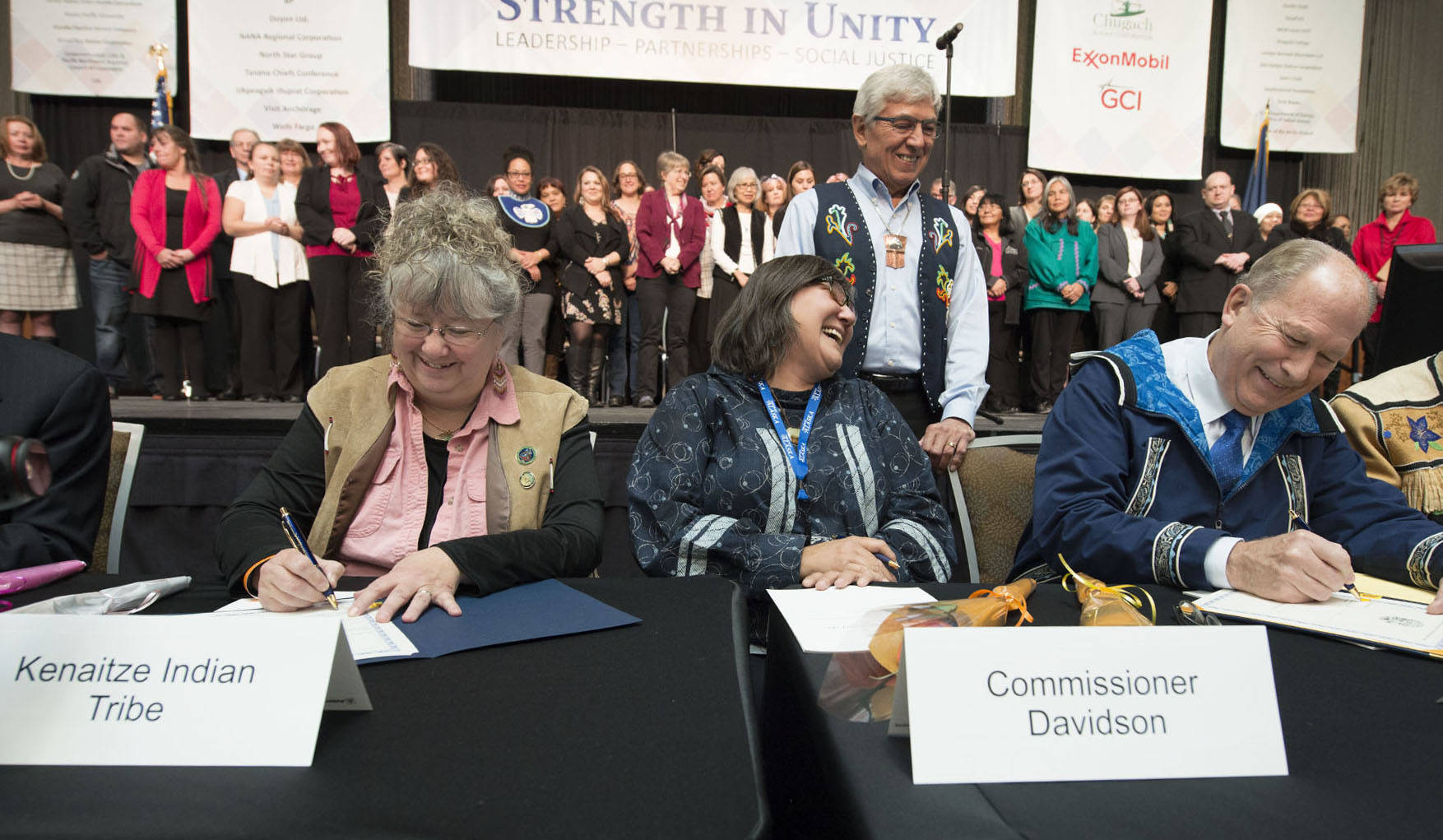The Kenaitze Indian Tribe signed a government-to-government agreement to take over child welfare activities from the state on Thursday at the Alaska Federation of Natives Convention in Anchorage.
The Kenaitze were among the 18 Alaska tribes to sign the agreement — called the Alaska Tribal Child Welfare Compact — which will give the tribe duties formerly carried out by the Alaska Office of Children’s Services (OCS) including adoption, foster care licensing, and abuse and neglect investigations.
“It really opens the door to the tribes to be acknowledged as sovereign governments,” said Kenaitze Tribal Court Judge Kim Sweet, who was one of the three negotiators on behalf of the tribes. “The compact recognizes the fact that our children are our greatest resource — that’s how tribes continue on into the future. And that Alaska Native culture keeps Alaska Native children safe. Being able to afford that to our children, now, it’s been a long time coming for sure.”
While about 19 percent of Alaskan children are Native or American Indian, those groups make up about 55 percent of children in foster care, according to a press release from the office of Alaska Governor Bill Walker, also a signer. Of Native foster children, 61 percent are placed in non-Native homes, Walker’s release states.
When the national congress passed the Indian Child Welfare Act in 1978 — giving tribal governments jurisdiction over child custody cases in their areas — 93 percent of adopted Native children were in non-Native families, according to statistics cited in the compact. Between 1973 and 1976, the rate of adoption for Native children was five times higher than for non-Natives, with one of every 29.6 Native children adopted.
For 23 years, Sweet said, the disproportionality has been discussed by the Tribal State Collaboration Group, on which she’s represented the Kenaitze Tribe for the past five years. OCS’s parent agency, the Department of Health and Social Services, had considered turning over services to tribes in its April 2016 five-year plan for improving treatment of Native children. They reached out to the Alaska Federation of Natives and began negotiating the agreement this April, according to an email from according to an email from OCS Director Christy Lawton.
“Alaska recognizes that a cultural and racial barrier exists within the delivery of services to minority populations in Alaska,” states the Department of Health and Services’ Child and Family Services 2017 Review. “OCS workers often have difficulty engaging with Alaska Native families because of fear and mistrust by the families and lack of cultural competency of OCS workers. As a result, families are often unwilling to open their door, or to engage in services.”
The staffing shortages that have plagued OCS also encouraged collaboration with tribes. The agency has a 34 percent turnover and vacancy rate, with most new employees lasting 18 months, the review states. The review notes that “state and federal requirements placed on Alaska’s child protection workers at both the state and federal level are nearly impossible to successfully meet in every case” and that OCS workers are “challenged with the increasing threats of violence to their personal safety through this work.”
Tribes and groups working with them have gradually been taking a greater role in providing services to Native children. The 2017 review states that “in response to high caseloads and as part of ongoing Tribal collaboration efforts,” Office of Children’s Services began including visits by tribal workers in its count of caseworker visits in May 2016.
The Kenaitze Tribe presently has a family services department that partners with OCS under the Indian Child Welfare Act and is able to bring child custody, guardianship, and adoption cases to the tribal court. The tribe has been taking children into custody since the formal creation of the Kenaitze Tribal Court in 1986 — prompted in part by the suicide of a Kenaitze member while in state custody, Sweet said. The new compact goes beyond the present partnership, particularly by allowing tribal officials to review reports of child mistreatment that OCS has received but decided to “screen out” and not investigate. Having this ability will let the tribe offer services to a family before a problem is severe enough to become a custody case.
“If you get these screened out reports, a lot of times there’ll be numerous reports that get on the state’s radar, but there’s not enough to get out and do child protection proceedings until it gets really bad and the state has to act,” Sweet said. “So if we can get them from those initial reports that aren’t always screened in, then we can start offering services and put some supports around the family.”
Kenaitze’s Family Services department is presently funded entirely by the tribe. The compact will provide an addition fund source: the state will pay for services delivered on behalf of the Office of Childrens’ Services.
For some Native children already in foster care and OCS custody, Tribal caseworkers may replace the state’s in some services like searching for relatives and providing family visits, Lawton wrote. These services would fall to the tribes in January 2018.
Details remain to be negotiated before the compact becomes effective on Dec. 15. These include the specific services tribes will be taking over, how the tribes will define their service populations, and how the state will pay them for the services. Sweet will continue representing the Kenaitze tribe in these negotiations.
Reach Ben Boettger at ben.boettger@peninsulaclarion.com

